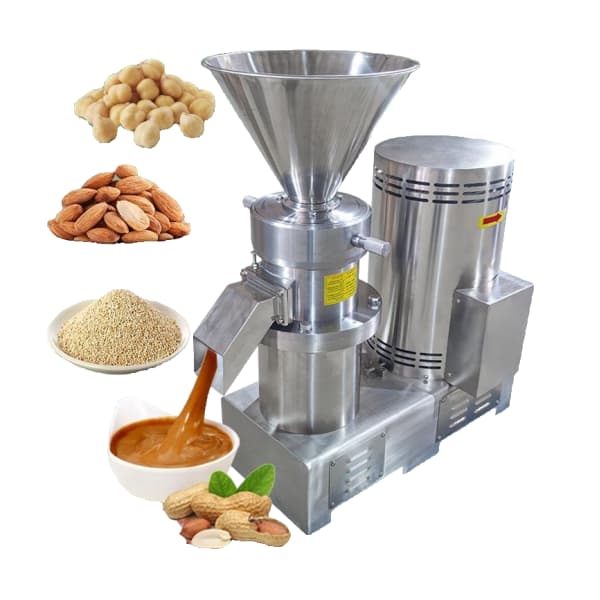Introduction
The colloidal mill is an indispensable team in the food industry, Pharmaceutical, Cosmetics and chemistry. Its main function is to reduce the size of particles in liquid or pasty suspensions, creating a homogeneous and stable mixture. This article explores in depth what a colloidal mill does, Its structure, Principles of operation, types, advantages, Application fields and much more. If you dedicate yourself to food transformation, MANUFACTURE OF CREAMS OR EMULSIONS, This content will be especially useful.

1. What is a colloidal mill?
A colloidal mill is a machine that is used for ultrafine grinding and the homogenization of liquid or semiquid materials. Its mechanical action reduces particles from a material to colloidal dimensions (between 1 nanometer and 1 micrometer), producing a uniform and stable suspension.
2. Structure of a colloidal mill
A colloidal mill is mainly composed of:
- Electric motor: Provides the necessary energy for the rotation of the discs or stators.
- Rotor and stator: They are discs that rotate at high speed, one fixed and another mobile. Among them is an adjustable separation where the grinding process occurs.
- Cooling system: Many models include cooling systems to avoid product overheating.
- Product feed and output hopper.
3. Principle of operation
The colloidal mill works under the combined principles of:
- Shearing: Generated by high relative speed between the rotor and the stator.
- Friction: As the particles rub each other and against the albums.
- Turbulence and impact: The rotation causes swirls that contribute to the disintegration of particles.
This continuous process allows particle size to be reduced effectively and achieve a uniform mixture.
4. Types of Colloidal Mill
4.1 Molino coloidal vertical
- Compact, Ideal for continuous processes.
- Used in the food industry, cosmetics and chemistry.
4.2 Horizontal colloidal mill
- Greater processing capacity.
- Better for viscous materials.
4.3 Colloidal mill
- Use abrasive stones for more traditional grinding.
- Ideal for products such as peanut butter, Tahini, etc.
5. Industrial applications
5.1 Food industry
- Peanut cream
- Soy milk and almonds
- Sauces and dressings
- Fruit pastes
- Mayonnaise and food emulsions
5.2 Pharmaceutical industry
- SUSPENSIONS AND MEDICINAL EMULSIONS
- Ointments and creams
5.3 Cosmetic industry
- Facial and body creams
- Gels and shampoos
- Fluid makeup
5.4 Chemical industry
- Paintings and inks
- Lubricants and waxes
- Asphalt emulsions
6. Advantages of Colloidal Mill
- Effective particle reduction at the microscopic level
- High Efficiency of Mixing and Homogeneization
- Versatility in various industrial sectors
- Continuous or batch processing
- Easy cleaning and maintenance
7. Comparison with other technologies
| Technology | Final particle size | Mixing efficiency | Applications |
|---|---|---|---|
| Colloidal mill | 1 nm – 1 µm | Alta | Emulsions, creams |
| Ball mill | 10 – 100 µm | Media | Mining, pigments |
| High pressure homogenizer | 100 – 500 nm | Alta | Leche, juices |
| Industrial Batter | 10 – 500 µm | Baja | General mixtures |
8. Common technical specifications
| Model | Ability | Power | Rotor speed | Material |
| DT-50 | 50 kg/h | 1.5 kW | 2800 rpm | Stainless steel 304 |
| DT-100 | 100 kg/h | 3 kW | 2800 rpm | Stainless steel 316 |
| DT-130 | 200 kg/h | 5.5 kW | 2800 rpm | 316L stainless steel |
9. Maintenance and cleaning
- Iss deassemble the rotor and stator periodically
- Clean with hot water or food solvents
- Check the sealing and lubrication system
- Verify the alignment and wear of the discs
10. Frequently asked questions (FAQ)
Can I use a colloidal mill to make peanut cream?
Yeah. It is one of the most common uses thanks to its ability to produce a soft and uniform texture.
What materials cannot be processed in a colloidal mill?
Dry materials, Extremely abrasive or that solidify quickly can damage the equipment.
Does it require a lot of maintenance?
No. Its maintenance is simple if performed on a regular basis.
11. Tips for choosing a colloidal mill
- Determine the type of product you want to process
- Verify the viscosity of the material
- Consider the daily production volume
- Choose materials in contact with the product (For example, 316L stainless steel for food)
12. Future of Colloidal Mills
- Integration with IoT sensors
- Greater automation and PLC control
- Improved health designs
- Energy efficiency
Conclusion
The colloidal mill is an essential tool for those who seek to produce emulsions, suspensions or pasta with high homogeneity. Its effectiveness, versatility and ease of use make it an ideal option for small, medium and large companies. If you are considering improving your industrial processes, A colloidal mill is undoubtedly an intelligent investment.
